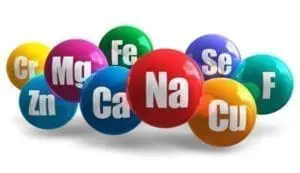
In order for water to be beneficial for health, it must first be filtered (removing pollutants) but above all it must preserve its minerals because they contain the natural synergy of trace elements which are fully metabolizable. Dry residues in water are composed of:
- Minerals assimilable by the body (between 5% and 25% of inorganic minerals) including trace elements
- Minerals not metabolizable by the body (between 95% and 75% of inorganic minerals)
- The Bioelectronic analysis (cold water), the analysis on water crystals (cold water) as well as the analysis on the treatment of limestone (heated water), seem to confirm that the dynamization of water transforms the ionic form of inorganic minerals (i.e. electrically charged ions) present in water in colloidal form (i.e. electrically neutral ions whose structure and size change).
- Concerning the inorganic minerals present in the dynamized water, we can therefore estimate on the basis of these analyzes that these should therefore remain mainly in the intestine and be evacuated rather via the stools than via the kidneys-urine!
Metabolization – removal of minerals into drinking water
1/ Untreated tap water, minerals appear:
- Mainly in ionic form (electrically charged) which is:
- In majority pass the membrane of the intestinal wall and are partly metabolized – absorbed (from 5% to 25% of all the minerals present in the water), depending on the ionic gates adapted for them. For the remainder they are evacuated via the kidneys/urine
- In minority remain in the intestine and are evacuated via the stools
- Incidentally in colloidal form (for their behavior, see below)
2/ Dynamized tap water, the minerals would appear:
- Mainly in colloidal form (electrically neutral and smaller sizes) of which:
- A majority would have a size > 50 nm and would remain in the intestines and would therefore be evacuated through the stools
- A minority would have a size between 0 & 50 nm and would pass the intestinal wall by tunnel effect through a door not intended for and would be partly metabolized depending on the needs of the person (from 5% to 25% of all the minerals present in water). These would therefore be evacuated via the kidneys/urine
- Incidentally in ionic form (for their behavior, see above)
Importance of minerals in drinking water

- Natural waters contain inorganic mineral salts, mainly calcium and magnesium (+/- 80%). These minerals are partly metabolizable by the body (intestinal absorption). Studies on the subject estimate this rate of assimilation between 5% and 25%!
- The minerals contained in natural water therefore participate between 20% and 50% in the Recommended Nutritional Intake (RNI) of calcium and magnesium* for one person (for an adult M / F: calcium requirement +/- 900 mg /d, in magnesium +/- 400 mg /d)! Calcium and magnesium are therefore useful for health. Calcium contributes to bone health, has a beneficial role in hypertension, cardiovascular accidents, colon cancer. Magnesium is involved in the activation of more than 300 enzymatic systems, fights fatigue, diabetes and coronary insufficiency as well as osteoporosis … Knowing that the average population has an average calcium deficiency of +/- 40% (average nutritional needs) and even 70% for magnesium, it therefore seems essential to us to drink mineralized water with a mineral content of up to 500 mg/L! * This depends on the mineral content of the water and the age of the people concerned, Source: Study on the absorption of calcium and magnesium in natural mineral waters, Patrice Fardellone, CHU Amiens, Université Picardie Jules-Verne, 2015 ; « The mineral elements present in tap water, by participating in the daily mineral supply necessary for the proper functioning of the body, have a definite beneficial role for health. Calcium in water could also play a role in protecting against cardiovascular disease. The role of calcium in fat elimination and blood cholesterol regulation is also recognised » (source Ministry of Health France 2006).
- The WHO (World Health Organization) speaks of an “optimum below 1000 mg / liter“.
- The Superior Council of Public Hygiene of France fixes in its decrees of 1990 and 1995 relating to the quality of water intended for human consumption the quantity of dry residues, after drying at 180 ° C, at maximum 1,500 mg / liter.
- It is also important to have calcium-magnesium (components of limescale) in the water because of the rounder and velvety taste of water containing mineral salts.





